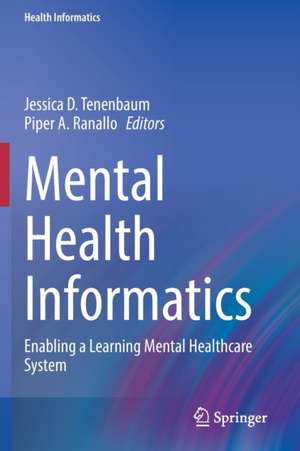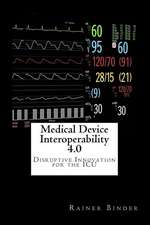Mental Health Informatics: Enabling a Learning Mental Healthcare System: Health Informatics
Editat de Jessica D. Tenenbaum, Piper A. Ranalloen Limba Engleză Paperback – 20 noi 2022
Mental Health Informatics: Enabling a Learning Mental Healthcare System is a comprehensive introductory resource for students, educators and researchers in mental health informatics and related behavioral sciences. It is an ideal resource for use in a survey course for both pre- and post-doctoral training programs, as well as for healthcare administrators, funding entities, vendors and product developers working to make mental healthcare more evidence-based.
| Toate formatele și edițiile | Preț | Express |
|---|---|---|
| Paperback (1) | 418.60 lei 3-5 săpt. | +36.59 lei 7-13 zile |
| Springer International Publishing – 20 noi 2022 | 418.60 lei 3-5 săpt. | +36.59 lei 7-13 zile |
| Hardback (1) | 590.01 lei 38-45 zile | |
| Springer International Publishing – 19 noi 2021 | 590.01 lei 38-45 zile |
Din seria Health Informatics
- 5%
 Preț: 429.40 lei
Preț: 429.40 lei - 5%
 Preț: 458.30 lei
Preț: 458.30 lei - 5%
 Preț: 326.78 lei
Preț: 326.78 lei - 5%
 Preț: 353.44 lei
Preț: 353.44 lei - 5%
 Preț: 787.58 lei
Preț: 787.58 lei - 5%
 Preț: 1038.14 lei
Preț: 1038.14 lei - 5%
 Preț: 269.08 lei
Preț: 269.08 lei - 5%
 Preț: 488.26 lei
Preț: 488.26 lei - 5%
 Preț: 570.44 lei
Preț: 570.44 lei - 5%
 Preț: 404.76 lei
Preț: 404.76 lei - 5%
 Preț: 342.02 lei
Preț: 342.02 lei - 5%
 Preț: 416.37 lei
Preț: 416.37 lei - 5%
 Preț: 384.04 lei
Preț: 384.04 lei - 5%
 Preț: 341.47 lei
Preț: 341.47 lei - 5%
 Preț: 385.01 lei
Preț: 385.01 lei - 5%
 Preț: 363.07 lei
Preț: 363.07 lei - 5%
 Preț: 735.46 lei
Preț: 735.46 lei - 5%
 Preț: 769.80 lei
Preț: 769.80 lei -
 Preț: 384.86 lei
Preț: 384.86 lei - 5%
 Preț: 727.44 lei
Preț: 727.44 lei - 5%
 Preț: 719.74 lei
Preț: 719.74 lei - 5%
 Preț: 724.14 lei
Preț: 724.14 lei - 5%
 Preț: 649.68 lei
Preț: 649.68 lei - 5%
 Preț: 723.21 lei
Preț: 723.21 lei - 5%
 Preț: 589.18 lei
Preț: 589.18 lei - 5%
 Preț: 1104.48 lei
Preț: 1104.48 lei - 5%
 Preț: 366.70 lei
Preț: 366.70 lei - 5%
 Preț: 905.70 lei
Preț: 905.70 lei - 5%
 Preț: 717.00 lei
Preț: 717.00 lei - 5%
 Preț: 1122.94 lei
Preț: 1122.94 lei - 5%
 Preț: 731.80 lei
Preț: 731.80 lei - 5%
 Preț: 776.78 lei
Preț: 776.78 lei - 5%
 Preț: 844.27 lei
Preț: 844.27 lei - 5%
 Preț: 1102.10 lei
Preț: 1102.10 lei - 5%
 Preț: 380.25 lei
Preț: 380.25 lei - 5%
 Preț: 720.84 lei
Preț: 720.84 lei - 5%
 Preț: 771.30 lei
Preț: 771.30 lei - 5%
 Preț: 717.73 lei
Preț: 717.73 lei - 5%
 Preț: 388.48 lei
Preț: 388.48 lei - 5%
 Preț: 423.84 lei
Preț: 423.84 lei - 5%
 Preț: 724.50 lei
Preț: 724.50 lei
Preț: 418.60 lei
Preț vechi: 440.63 lei
-5% Nou
Puncte Express: 628
Preț estimativ în valută:
80.10€ • 83.63$ • 66.29£
80.10€ • 83.63$ • 66.29£
Carte disponibilă
Livrare economică 14-28 martie
Livrare express 28 februarie-06 martie pentru 46.58 lei
Preluare comenzi: 021 569.72.76
Specificații
ISBN-13: 9783030705602
ISBN-10: 3030705609
Pagini: 534
Ilustrații: X, 534 p. 120 illus., 96 illus. in color.
Dimensiuni: 155 x 235 x 35 mm
Greutate: 0.76 kg
Ediția:1st ed. 2021
Editura: Springer International Publishing
Colecția Springer
Seria Health Informatics
Locul publicării:Cham, Switzerland
ISBN-10: 3030705609
Pagini: 534
Ilustrații: X, 534 p. 120 illus., 96 illus. in color.
Dimensiuni: 155 x 235 x 35 mm
Greutate: 0.76 kg
Ediția:1st ed. 2021
Editura: Springer International Publishing
Colecția Springer
Seria Health Informatics
Locul publicării:Cham, Switzerland
Cuprins
Precision Medicine and the Learning Health System.- What is Informatics?.- What is Mental Health?.- Epistemological Differences between the Behavioral and Biological Sciences.- What is Mental Health Informatics?.- Big Picture: Process View of Mental Health Care Delivery.- Introduction to Technologies for Data Acquisition in Mental Health.- Informatics Technologies for the Acquisition of Biological Data.- Informatics Technologies for the Acquisition of Psychological and Behavioral Data.- Informatics Technologies for the Acquisition of Interpersonal, Social and Environmental Data: The Exosome.- Informatics Technologies for the Acquisition of Population Level Data.- Introduction to Methods for Extracting Meaningful Information from Data in Mental Health.- Concept and Knowledge Representation to Transform Data into Information in Mental Health.- Bioinformatics Methods in Mental Health Research and Practice.- Psychometric Methods.- Computational Models and Analytic Methods.- Natural Language Processing in Mental Health Research and Practice.- Introduction to Paradigms for Knowledge Discovery in Mental Health.- Paradigms for Knowledge Discovery in Clinical and Research Data Repositories.- Biomarker Discovery.- Data Visualization.- Inferential Analysis and Predictive Modeling.- The Role of Biological Information in Mental Health Research and Practice.- Electronic Health Record (EHR) Systems in Mental Health.- Computerized Clinical Decision Support in Mental Health.- Informatics Technologies in Detection and Diagnosis of Mental Health Conditions.- Informatics Technologies in Prevention and Treatment of Mental Health Conditions.- Informatics Technologies for Care Coordination and Continuity of Care.- Informatics Technologies to Improve Patient Safety in Mental Health.- Registries.- Disseminating Newly Acquired Knowledge.- Ethical Legal and Social Issues (ELSI).- The Future of Mental Health Informatics.
Notă biografică
Dr. Tenenbaum is in the Division of Translational Biomedical Informatics within the Department of Biostatistics and Bioinformatics at Duke University. After earning her bachelor’s degree in biology from Harvard, Dr. Tenenbaum worked as a program manager at Microsoft Corporation in Redmond, WA for six years before earning a PhD in biomedical informatics at Stanford University. Her research applies expertise in data standards, electronic health records, and machine learning to stratify mental health disorders to enable precision medicine. She is also the informatics faculty lead for the Alzheimer's Disease Metabolomics Consortium. Nationally, Dr. Tenenbaum has served on the Board of Directors for the American Medical Informatics Association (AMIA) and serves on the Board of Scientific Counselors for the Lister Hill Center at the National Library of Medicine. She is co-founder and past Chair of AMIA's Mental Health Informatics Working Group. She has been an Associate Editor for the Journal of Biomedical Informatics and serves on the advisory panel for Nature Scientific Data. Beginning in 2019, Dr. Tenenbaum took a partial leave of absence from Duke to serve as Chief Data Officer for the North Carolina Department of Health and Human Services.
Dr. Ranallo is an applied clinical informatician dedicated to formalizing the field of mental health informatics. She completed her undergraduate training at UCLA where she performed basic laboratory research on the distribution of neuropeptides in the mammalian nervous system, and psychosocial research examining the effects of developmental trauma on children’s self-concept. She completed her PhD at the University of Minnesota where she worked to address gaps in technologies for knowledge representation in mental health. She has front line experience developing and implementing informatics strategies in a variety of research and clinical settings. She is committed to bringing the quality and safety of mental healthcare on par with that of general medical healthcare.
Dr. Ranallo is an applied clinical informatician dedicated to formalizing the field of mental health informatics. She completed her undergraduate training at UCLA where she performed basic laboratory research on the distribution of neuropeptides in the mammalian nervous system, and psychosocial research examining the effects of developmental trauma on children’s self-concept. She completed her PhD at the University of Minnesota where she worked to address gaps in technologies for knowledge representation in mental health. She has front line experience developing and implementing informatics strategies in a variety of research and clinical settings. She is committed to bringing the quality and safety of mental healthcare on par with that of general medical healthcare.
Textul de pe ultima copertă
This textbook provides a detailed resource introducing the subdiscipline of mental health informatics. It systematically reviews the methods, paradigms, tools and knowledge base in both clinical and bioinformatics. Key foundational technologies, such as terminologies, ontologies and data exchange standards are all covered. The learning health system model is utilized to emphasize the bi-directional nature of the translational science associated with mental health processes. Descriptions of the data, technologies, paradigms and products that are generated by and used in each process and their limitations are discussed.
Mental Health Informatics: Enabling a Learning Mental Healthcare System is a comprehensive introductory resource for students, educators and researchers in mental health informatics and related behavioral sciences. It is an ideal resource for use in a survey course for both pre- and post-doctoral training programs, as well as for healthcare administrators, funding entities, vendors and product developers working to make mental healthcare more evidence-based.
Caracteristici
Ideal for use by institutions to integrate behavioral science training into their clinical- and bioinformatics programs Presents a coherent learning health system rubric to understand disparate data, methods and technologies Comprehensively introduces the field of Mental Health Informatics within precision medicine
















